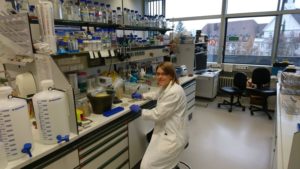It is widely accepted that the energy-producing organelles of eukaryotic cells, mitochondria and chloroplasts, are derived from once free-living ancestors. In the course of evolution, the vast majority of genes have been relocated to the nucleus. If the function of the proteins encoded by these genes is still important in today’s world, they are imported into the organelles after being translated on cytosolic (eukaryotic) ribosomes. But, why are some genes kept in the miniature genomes of mitochondria and chloroplasts? It has been proposed that genes are retained in organelles because their codon usage or base composition might prevent the efficient expression of organellar genes in the nucleus, because some proteins might be difficult to import across the double organelle membranes, or because their expression must be tightly coupled to the redox state of the respective electron transport chains.
In our Opinion paper in Trends in Plant Science (2025), we propose that mRNA targeting is a previously unappreciated mechanism to explain gene retention in chloroplasts. In brief, we propose that mRNAs encoding proteins central to photosynthesis have to interact with the thylakoid membrane systems and that this is critical for localizing the encoded proteins to the membrane, and coordinating early steps of complex assembly.
We developed this idea, based on recent experimental data, together with Conrad Mullineaux (London) and Annegret Wilde (Freiburg).
Category: Uncategorized
PhD opportunity to explore the principles of gene regulation in cyanophages
OCT 04, 2024: Would you like to do a PhD with us? Would you like to work with the tiniest, most fascinating photosynthetic organisms on Earth?
Would you like to learn more about the gene expression regulation in their infecting cyanophages?
A DFG-funded PhD position (E13, 65%) on the intricate regulation of the expression program of T4-like cyanophages is available at Cyanolab in Freiburg within the frame of the DFG-funded Priority Program SPP 2330 “New Concepts in Prokaryotic Virus-host Interactions – From Single Cells to Microbial Communities“. The intended start date is January 2025, or upon negotiation and the position is for a duration of 3 years.
One of Cyanolab’s research focuses on the fundamental understanding of the cyanophage-cyanobacteria system. For relevant publications, see ISME J (2016) 10, 1437–1455; Genetics (2016) 203, 1149–1159; Microorganisms (2022) 10, 2245; Nature (2007) 449(7158), 83-6.
The overarching aim of this project is to gain understanding into how the genome expression programs of marine T4-like cyanophages are regulated at the transcriptional and post-transcriptional levels. The work plan includes the identification and characterization of RNA-binding proteins involved in the post-transcriptional regulation of phage RNAs and the elucidation of phage factors that interact with host RNA polymerase using state-of-the-art experimental approaches.
We seek a highly motivated candidate with a background in biochemistry, molecular biology or molecular genetics (M.Sc. or equivalent).
The project is co-funded with the group of Debbie Lindell at Technion in Haifa, Israel.
Please send your application by Email to: claudia.steglich@biologie.uni-freiburg.de
Please include (1) a CV in tabular form, (2) a brief summary of previous research experience and academic qualifications, (3) scanned copies of university degrees and (4) contact details for at least one reference.
Congratulations to Matthias (Matze)!
Matthias has defended his doctoral thesis on “The complexity of gene regulatory networks in a photosynthetic model organism” at October 26, 2020, with summa cum laude. Big congratulations to this outstanding result and thanks to the DFG for funding through the “MeInBio – BioInMe” PhD program!
Award for the best doctoral thesis in the last year
We congratulate Juliane, for receiving the “Elisabeth Gateff Prize 2019” from the German Genetics Society and the “Hans Grisebach Preis 2019” of our university, for her outstanding dissertation on the „Identification and characterization of crRNA processing endoribonucleases and new insights in adaptation and interference during CRISPR-Cas immunity in the model cyanobacterium Synechocystis sp. PCC 6803“!

Meeting on “Sensory and Regulatory RNAs in Prokaryotes”, July 18-19, in Freiburg
Our website for the annual meeting on “Sensory and Regulatory RNAs in Prokaryotes” is online now. We feel privileged that this year’s meeting will take place in Freiburg and are looking forward to it!
Congratulations to Steffen!
On FEB 04, 2019, Steffen defended his doctoral thesis on the topic of „Big Data Meets Biology – Revealing Hidden Layers Of Information“. Steffen has contributed to workflow and data modularization concepts for RNA-Sequencing and metatranscriptome experiments, developed an approach for the automated and reliable detection of homologs to bacterial sRNAs and much more. Big congratulations for finishing the thesis work so well!